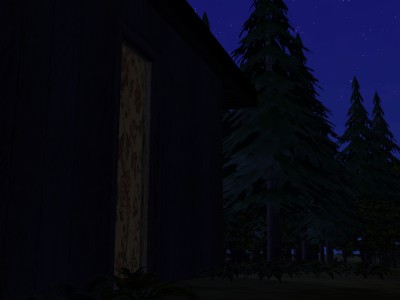
“Baby? Sleeping?”
The girl did not answer, and Egelric wrapped his blanket around himself and prepared to go to sleep as well, satisfied. She had, apparently, giggled herself to sleep.
He didn’t know why, but he had suddenly asked her, once they were both stretched out to sleep, whether he had ever told her the story about how her grandfather had walked on the moon as a boy. He knew he hadn’t, for he didn’t think he could tell it properly – it had been nearly thirty years since he had heard it told. But somehow, out here where he could hear the sighing of the sky in the pines, he had wanted to try.
They were in his little shack, the two of them, Iylaine sleeping on the narrow bed, and he on the floor, rolled up in a scratchy blanket of raw wool with a few skins beneath him.

It had not been his idea.
Alred had brought her out to the site that day, along with his two sons and young Bertie. He had made it seem a lark to the children, and he had copiously ridiculed Egelric for losing track of the days of the week. The day before had been the first Sunday on which Egelric had neglected to return home, though he had not lost track of the days – he had simply found himself unable to face his daughter. But he could see by the look on Alred’s face that it was important that he play along, and so he had, and Iylaine had laughed at him, and all was forgiven.
Now it was Alred’s eyes that Egelric could not meet. He knew Alred knew. What’s more, he knew what it meant for Alred to come out this far for the day and the night. He knew how Matilda suffered, and he knew how Sigefrith needed a shoulder on which to lean, and he knew that even the Earl was in a difficult situation just then. It made his own behavior, based as it was solely on self-pity and self-condemnation, all the more despicable.
But it was his own self-pity and his own self-condemnation that made him say so. Alred never would.
It had been Iylaine’s idea to sleep in the shack. They had meant to sleep in the great house at the camp with the Duke and the boys, but Iylaine had begged him to take her to the little shack of which he had told, and despite his own misgivings about bringing a seven-year-old girl out into a doorless, fireless shed on such a cold night, he had given in.

He was not entirely sorry he had. Iylaine had been fascinated by the beauty of the strange, still lake in the moonlight. She had not run shrieking up and down the banks like a pagan, as he had feared, but had sat quietly beside him, listening and watching and thinking.
It was both gratifying and frightening to him to be reminded that Iylaine was not only a charming, playful child, like some sort of large, blonde kitten, but also a little person with thoughts and dreams and, sadly, secrets and sorrows of her own as well.
They had been thinking their own thoughts and dreaming their own dreams that evening, but they had been thinking and dreaming together, and that was already a wonderful thing in this imperfect world.
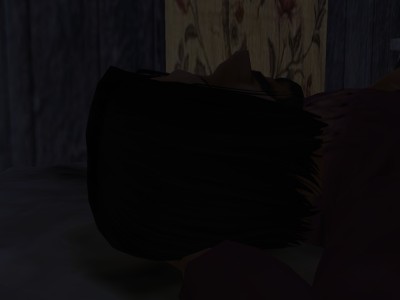
He wondered briefly whether he could not simply bring Iylaine here, and keep her by the shores of the lake, far from the teasing children, but before he even had a chance to remind himself of the impracticalities of the idea, he was disturbed by a gust of cold air as the cloth hanging before the door flapped open, and a moment later a foot stubbed directly into his ribs, and he cried out.
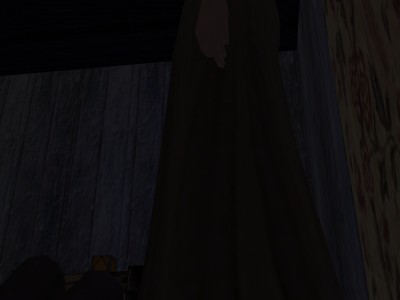
Another voice cried out too – a woman’s voice.
“You!” he hissed, fumbling out of his blankets and to his feet. “Get out!”
“Oh!” the woman cried again.
“Get out! Get out! Get out of here!” he snarled, practically foaming at the mouth.

“Da?” Iylaine whimpered in alarm.
The woman slipped back through the doorway, and he turned towards his daughter in the dark.
“It’s all right, Baby, it’s nothing,” he assured her, though his voice was still harsh with anger.
“Who was it?”

“Only a stupid dog.”
“It sounded like a woman.”
“It was only a dog, Baby. Go back to sleep.”
“Who was it?”
“Nobody, Baby,” he said, growing impatient with her questions and especially with his inability to answer them.
“Who was it? What did she want in the night?”
“Nothing, Baby.”
“It was a woman, wasn’t it? What did she want?”
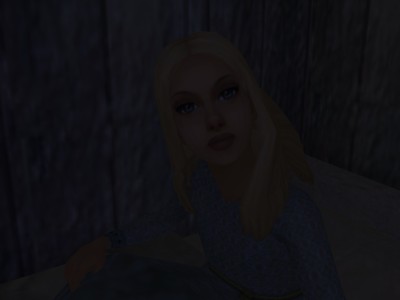
“No more questions, Iylaine! Everyone back to sleep.”
“You have a woman here,” she accused, her voice growing higher by the minute. “What do you do with her?”
“Nothing, Iylaine! Nothing! Go to sleep now. There’s no one here.”
“What did she want?” she asked in a sort of panic. “You don’t mean to have a baby with her, do you?”
“Iylaine!” he barked. “Whoever put such an idea into your head? With whom have you been talking now?”

“I don’t know,” she whimpered.
“That’s right! You don’t know! What do you ever know? Every time I ask you something, you don’t know! Whom do you suppose I should ask then, if you don’t know?”

“I don’t kn – ” she began, and then interrupted herself, trying to catch both her words and a sob in her hands.
“The devil!” he swore and stormed out through the door, shaking with anger.
He was not angry at her. He was angry at himself, angry at the woman, angry at the person or the people or the creatures with whom she had been speaking, and whose identities she stubbornly refused to reveal. He was angry at many more things besides, but mostly at himself, for he was the cause of most of the rest.
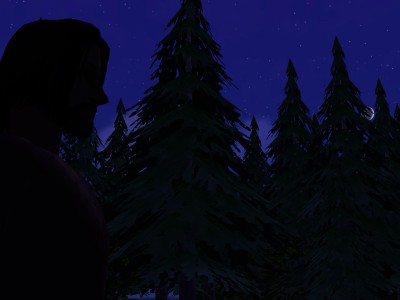
He walked out the few yards to the shore of the lake and looked down into the moon-bright water. On this small arm of the great lake, with its uneven shore and its small, pine-covered islands, the white-silted bottom was near enough to be seen, but he knew that, farther out, the body of the lake was so deep as to be bottomless to men.
He knew too that such a lake would have a cold undercurrent that would from time to time reach up and pull down anything that floated too near the air – anything, such as a man. It was not the first time he had had this thought.

He sat on a stump beside the water instead.
He would not have been more convinced that he was possessed by the temper of his mother if he had heard her own voice come out of his mouth. The only thing lacking was that he call his daughter a worthless gowk and occasionally swat at her head with the churn-staff.

Surely it would be better for her if he were to disappear. Gunnilda and Alwy could take care of her, or his lord and his lady. These were all people who knew how to care for children. Gunnilda could certainly nag, and Alred could thunder like Jupiter on his mount when the boys had been up to something, but both of them lacked the razor edge of sarcasm that he himself had.
He didn’t mean the things he said, but it was as if his mother spoke through him – as if his mother were one of the unclean spirits that possessed men in the days when the Lord still walked the earth to cast them out.
Suddenly he wondered whether his mother had ever had the anguished regrets he did, and whether she had ever cursed her hard and sarcastic father for possessing her.
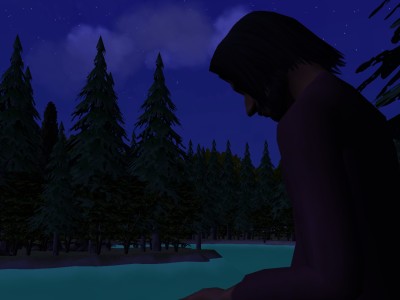
And then he wondered whether Iylaine would one day sit and cry into her apron over the dreadful things she had said to her children, and curse him for making her that way.
At that thought he began blubbering like a child. He was a worthless gowk, as his mother and grandfather had often reminded him. Perhaps they had made him that way, perhaps it was simply in the blood, but so he was. What right had he to have the care of a child? It was probably better for Finn that he be taken away from him before it became too late. Perhaps Finn would grow up to be a good man. Perhaps…
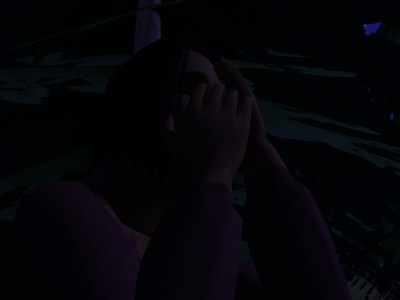





“They had been thinking their own thoughts and dreaming their own dreams that evening, but they had been thinking and dreaming together, and that was already a wonderful thing in this imperfect world.”
That’s beautiful. Egelric and Iylaine’s relationship is one of the backbones of the series. I forgot how touching it could be. I wonder if Egelric ever wishes he could just go back to this, unhappy as he thought he was at the time.